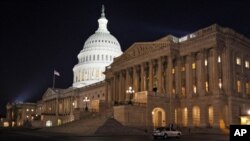A congressional panel held a hearing on Wednesday on the increasing number of "insider attacks" by Afghan forces and Afghan private security guards on U.S. and NATO troops they are supposed to protect. Senior U.S. Defense Department officials say a majority of the attacks are motivated by personal issues and are not controlled or directed by insurgent groups.
U.S. Defense Department officials told members of the House of Representatives Armed Services Committee that since 2007, the attacks have killed 70 people and left 110 others wounded.
House Armed Services Committee Chairman Howard McKeon, a Republican from California, outlined the problem.
"No less than one percent of Afghan forces and security guards have attacked coalition forces," said McKeon. "This is 42 attacks too many, and the new process must do better."
New security procedures were implemented after an attack in March 2011 that killed two U.S. soldiers and wounded four others. The parents of one of the soldiers who was killed, Army Specialist Rudy Acosta, attended the hearing. The Acosta family is asking lawmakers to take action to prevent a similar tragedy, saying that U.S. forces in Afghanistan should guard themselves, and not be guarded by Afghan nationals.
Representative Adam Smith, a Democrat from Washington state, joined McKeon and others speaking at the hearing in offering condolences to the families of those who have lost loved ones in Afghanistan.
"It is indeed a very serious and troubling situation," said Smith. "Our troops are in Afghanistan to protect the Afghan people and to protect their government. And to be turned on by the very people they are fighting with and for, undermines the entire operation and places our troops at an unacceptable level of risk."
On January 20 of this year, an Afghan soldier shot and killed four French troops, which prompted France to threaten to withdraw its combat forces from Afghanistan earlier than planned. This week, an Afghan soldier shot and killed a NATO service member in southern Afghanistan.
When asked why U.S. and NATO forces use local contractors to guard their bases, Gary Motsek, Deputy Assistant Secretary of Defense, gave this answer:
"Generally speaking, contractors perform well and provide essential support to the conduct of our operations within Afghanistan," said Motsek. "Without them, under the present conditions there, we would have to divert approximately 20,000 troops from essential combat tasks to perform non-combat related security functions. And our allies in Afghanistan are in a similar situation."
Defense department officials testifying at the hearing said local commanders on the ground can decide to use U.S. forces to guard a base, if they determine that it makes sense to do so.
Army Brigadier General Stephen Townsend said the United States is taking steps to reduce the threat of insider attacks by improving vetting procedures, including weekly biometric checks of contractors, and by providing cultural training to Afghan security forces and private guards as well as to U.S. service members.
Afghan President Hamid Karzai has ordered the withdrawal of all U.S. and other foreign contractors from Afghanistan as of March, which, analysts say, could raise even more security concerns.
Congress Probes 'Insider Attacks' Against Coalition Forces in Afghanistan
- By Cindy Saine




